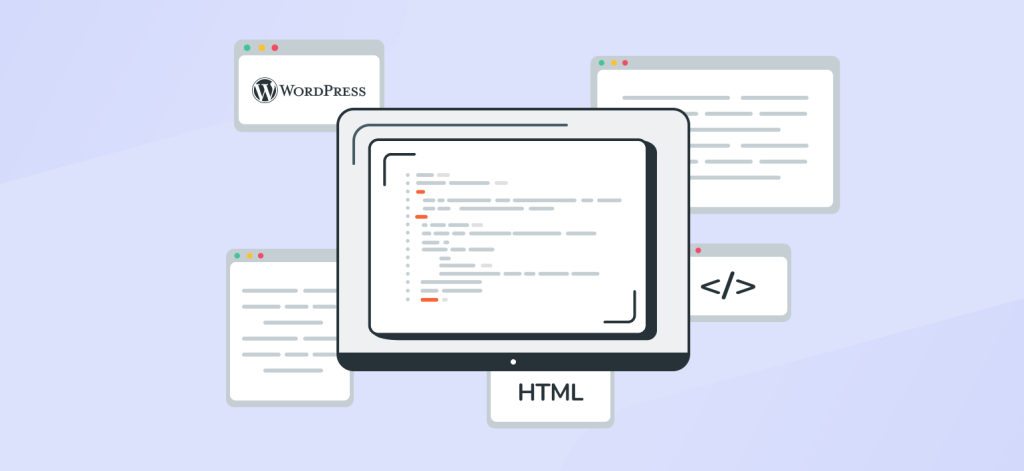- WordPress
- 13 min read
The Best 7 ChatGPT WordPress Plugins to Generate Content in 2023
Are you a WordPress website owner looking to generate content quickly using an AI-powered solution? Check out this review of the best ChatGPT plugins for a start.
Ready to take your agency to the next level with a reliable white-label WordPress development company, but not sure where to begin? Check out our guide for the key steps to find your perfect partner!

The business world is extremely tough. This is especially true for digital and marketing agencies. They’re constantly trying to strike a subtle balance between offering more services and having enough resources to meet the growing demand for them.
As far as website building goes, one method that helps agencies achieve balance like that is white-label WordPress development. This solution allows agencies to outsource website creation to an external provider and use the high-quality products they deliver under their brand.
That being said, if you really want to enjoy all the great benefits of this savvy model, you need to know how to choose a white-label WordPress development company the right way. A mistake here can lead to costly setbacks and missed opportunities down the line.
Fear not! In this post, we guide you through the key steps necessary to find the perfect white-label WordPress development company that will maximize your agency’s potential.
Let’s dive in!

As we’ve already explained, white-label services are a strategic approach that allows digital and marketing agencies to hire a third-party software company to handle specific development tasks for them. This includes everything from developing a new WordPress website to the maintenance and support of their clients’ solutions.
What makes the white-label development model different from the traditional approach is the ownership of the final product or service. In the latter case, the end product comes under the development company’s name, with the company’s in-house team responsible for every aspect of the website creation.
With white labeling, your agency gets a top-quality website or service from your development partner. You can then use it under your brand in any way you see fit. You can resell it, advertise your own services through it, and so on.
Another juicy benefit of white-label services is seamless adaptability to market fluctuations. You can effortlessly scale your operations up or down depending on the current demand.
You can also easily broaden your service lineup without having to go through the time-consuming and costly process of hiring new employees and training them.
For example, if your agency specializes in designing marketing strategies, you can expand your offerings with website development without involving your in-house developers or designers, or even if you don’t have them at all.
Additionally, there’s no overhead related to full-time employment like salaries, office space, supplies, professional software, and more. You only pay for the work your white-label partner has done for you, and that’s it!
Finally, by shifting the technical side of WordPress website development projects to an external provider, you give your team more opportunities to deliver outstanding value to your clients in your areas of expertise, such as social media marketing, paid advertising, brand design and development, and more.
To sum up, white-label services allow your agency to breathe freely, meet diverse client needs more efficiently, reduce your budget spending, grow faster, and gain a competitive advantage over the other players in your industry.
But, again, all those fantastic benefits can go down the drain if you don’t invest enough effort and time into choosing a reliable partner for outsourcing your services.
So, what to look for in a white-label WordPress developer in the first place? Let’s explore these crucial characteristics.

When researching your potential white-label partners, consider the following telltale signs. They clearly indicate whether a certain provider deserves your trust.
You wouldn’t want your clients’ sensitive data to be revealed to a third party without their consent, would you? Every trustworthy white-label service provider offers to sign a strong, legally binding non-disclosure agreement (NDA) upfront. If they don’t, this should be a bright-red flag for you.
While branding and acknowledgement are common with the traditional approach, white-label development agencies work behind closed doors, safeguarding their partners’ client trust and reputation.
This one directly relates to the first point. Since white-label development agencies are bound by NDAs, they are often unable to showcase previous projects they’ve done for digital and marketing agencies. Still, many of them also provide regular, non-white-label services, and fill their portfolio with those “normal” websites.
Take a close look at them. Do they resemble your project? What expertise did the company use to complete this or that website?
Many common development agencies offer a one-size-fits-all approach, without giving too much thought to their clients’ special requirements. That’s not the case with reliable white-label companies. Flexibility is their hallmark feature. They deliver solutions perfectly tailored to each client’s needs.
This doesn’t only mean customizing WordPress themes or plugins. It also involves creating entirely custom solutions that align immaculately with a specific client’s vision. This way, you can offer bespoke, personalized websites to your clientele, too.
Working with a regular WordPress development company, you can directly oversee their testing efforts. In contrast, a white-label agency operates behind the scenes, so you have to rely on their internal quality assurance processes to ensure high-quality deliverables.
Therefore, before signing an agreement with a white-label partner, it’s key to find out how they test products. What tools do they use? What quality standards do they adhere to? Receiving complaints from your clients about the quality of their websites is the last thing you want. Right?
Communication is extremely important under any scenario. But the white-label model makes this aspect pivotal. A white-label agency is basically an extension of your team. That’s why maintaining clear communication channels and enforcing effective project management practices are paramount for the success of your projects. Your partner should provide regular updates, responsive feedback, and transparent timelines.
The development of quality products is only one part of your collaboration with a white-label agency. All kinds of issues may happen to websites out in the wild. That’s why trustworthy providers offer support and maintenance services as well.
These services include troubleshooting, updating the WordPress core and plugins, making adjustments to the website functionality and appearance clients may require, and more. Perfectly functioning, well-performing websites contribute to higher client satisfaction and strengthen your agency’s reputation in the market.
Even when a white-label service provider has all the characteristics we’ve reviewed in this section, it’s their technical expertise that makes a real difference. So, the next step in the process of selecting the perfect partner for your agency is to assess their development skills and experience.

Here are the key areas you need to consider when evaluating your potential white-label partner’s technical capabilities:
Above all else, explore their proficiency in WordPress. What exact WordPress services do they offer? Do they craft custom themes and plugins? Execute complex integrations through APIs? Help with migration?
Review their website closely. Do they feature any certifications? These should tell you about their formal training and expertise.
Additionally, ask them if you can run a small test project. This is probably the best way to gauge the company’s technical prowess in practice and see how efficiently they handle your unique requirements.
WordPress is a dynamically evolving content management platform. Its developers regularly roll out various updates. Some have a significant impact on the entire WordPress ecosystem.
Your potential white-label partner should stay abreast with these latest trends and recent technological developments in general. Ask them how they integrate the newest WordPress updates and features. This will allow you to tell your clients that you’re delivering state-of-the-art solutions.
Also, find out if your potential white-label partner offers continuous training and learning opportunities for their staff, such as further education, certifications, and workshops. If they do, it means they’re dedicated to providing excellent customer service and innovative solutions.
Look for a company that’s actively involved in the industry. Why? Because it’s another marker of their expertise. By attending events such as webinars and WordCamps, a white-label agency stays in the loop about the latest industry trends and broadens its network of contacts. All this positively impacts the quality of your projects in the long run.
WordPress development is not plain sailing. It’s full of various technical challenges and problems that developers have to overcome all the time. White-label agencies are not an exception.
Since your projects most likely differ in scope and complexity, you need to understand how efficiently your potential white-label partner can cope with difficulties of technical nature.
Ask them for case studies or project descriptions, possibly without any client information if they’re NDA-protected. Study those documents carefully to get an idea about the partner’s problem-solving approach and crisis management skills.
Hold technical interviews with the white-label agencies on your shortlist. Basically, you should touch upon the aspects we’ve just discussed. Ask them about their WordPress expertise and experience.
Present them with various problems that typically arise during the development process and listen to their solutions. Find out about their project management methods. Do they use Agile methodologies like Scrum?
These interviews should provide you with valuable insights into the agencies’ technical arsenal and management style.
At this point, you should be ready to make the final choice of the white-label development partner. But the story doesn’t end here. The next important step is to ensure you’re on the same page regarding the communication process and team integration.

Here’s what you need to do to secure smooth collaboration with your white-label development partner:
The white-label team shouldn’t in any way disrupt your well-adjusted workflow, seamlessly blending into your current processes and team dynamics. How do you achieve that?
One way is to select a dedicated team model. It allows the white-label developers to become an integral part of your in-house team. They will rigorously follow your standards, culture, and methodologies.
Working on your projects without distractions to other tasks, the white-label team will gain a better understanding of your requirements and goals, providing the much needed consistency. Soon, you will naturally take the white-label developers as your own employees.
Clear and detailed documentation is super critical to ensure a smooth handover process. With everything, like steps and solutions, perfectly documented, you will avoid confusion when the white-label team transfers responsibility to yours. Your developers will easily pick up where the external team left off, minimizing or completely preventing disruptions.
For instance, by requesting well-documented code guidelines from your white-label partner, your full-time developers will quickly get to grips with the project specifics after delivery.
Often, even the most detailed documentation can be insufficient to maintain the momentum long after the project has been delivered. That’s when you need to ask your white-label partner to organize training sessions for your team members, covering everything from setting up WordPress to working with the custom features the external vendor has created.
These sessions will allow them to manage the solution without external assistance, offering continuous services to your clients.
Choosing a white-label WordPress agency to outsource your client projects is something that requires a lot of attention and effort on your part.
From evaluating technical capabilities and ensuring top confidentiality to establishing seamless collaboration, each factor is vital for the success of your projects. Guided by these criteria, you’ll be able to make an informed decision that matches your agency’s goals and your clients’ needs.
For a broader perspective, explore our detailed guide on choosing a general WordPress development company. It provides additional insights that can further enhance your selection process.
Ready to take the next step? Contact us today for a consultation. With our expertise in providing top-tier white-label WordPress development services, we are committed to helping your agency grow and improve your bottom line.